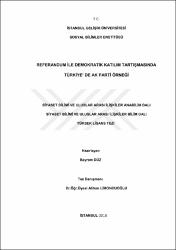| dc.contributor.author | Düz, Bayram | |
| dc.date.accessioned | 2019-07-18T12:57:00Z | |
| dc.date.available | 2019-07-18T12:57:00Z | |
| dc.date.issued | 2018-9-19 | en_US |
| dc.date.submitted | 2018-09-19 | |
| dc.identifier.uri | https://hdl.handle.net/11363/1351 | |
| dc.description | Danışman: Alihan Limoncuoğlu. | en_US |
| dc.description.abstract | Bu çalışmada referandumun tarihsel süreç içerisindeki yeri ele alınmıştır. Referandumun kökeni araştırılarak; hangi ülkelerde, ne zaman başvurulduğuna bakılmış ve demokrasi ile ilişkisi incelenmiştir. Türkiye'de yapılan Referandumlar ele alınarak olaylar kronolojik sıralama ile analiz edilmiş ve hangi siyasi aşamalardan sonra kabul edildiğine bakılmıştır. Özelikle askeri darbeler sonucunda hazırlanan yeni anayasa maddelerinin kabulü için halk oylamasına gidilmesi nedeniyle plebisit özeliği taşıdığı görülmüştür. Bu doğrultuda plebisit ve referandum karşılaştırılması yapılmıştır. 1961 yılından 2018'e kadar toplam yedi halk oylaması yapılmıştır. Yapılan bu referandumların üçü Adalet ve Kalkınma Partisi döneminde gerçekleştirilmiştir. En son yapılan (16 Nisan 2017) referandum ile de Türkiye'deki hükümet şekli değişmiş, parlamenter sistem kaldırılarak yerine ‘Cumhurbaşkanlığı Hükümet Sistemi’ getirilmiştir. Adalet ve Kalkınma Partisi döneminde üç kez referandum yapılmıştır. Yapılan bu Referandumların hepsi halkın çoğunluğu tarafından kabul edilmiştir. Bu nedenle Adalet ve Kalkınma Partisi’nin elde ettiği büyük toplumsal desteği açıklamak için Adalet ve Kalkınma Partisi’nin Yeni Sağ ile ilişkisi incelenmiştir. Türkiye özelinde bu ilişkinin araştırılması için ise, Adalet ve Kalkınma Partisi'nin Neo-liberalizm ile nasıl bir bağ kurduğu ve bu bağın temsili demokrasi açısından olası sonuçları tartışılmıştır. Bu çalışma ün ana bölümden oluşmaktadır. İlk bölümde demokrasi tanımı, çeşitleri ve referandumun tarihçesi incelenerek teorik bir çerçeve çizilmiştir. İkinci bölümde ise Adalet ve Kalkınma Partisi döneminde referandumun değişen anlamı ve 70’lerin Yeni Sağ ile ilişkisi incelenmiştir. Son bölümde ise: Türkiye’de yapılan referandumlar ve bu referandumlara gidilen süreçler incelenmiştir. Bu çalışma genellikle literatür taraması yapılarak teorik bir analizle ortaya konulmuştur. Bölümler arasında; araştırmanın konusu, amacı, problemi, kapsamı ve metodu hakkında genel bilgiler verilmiştir. | en_US |
| dc.description.abstract | This study deal with the importance of the referendum in the historical process. By looking at the origin of the referendum, the countries in which it was first applied in the world and when it was held were researched and the relationship with democracy was examined. Referendums held in Turkey were analyzed in chronological order by considering the events and has been examined which political steps were followed. Particularly for the acceptance of new constitutional articles prepared as a result of the military coup, it has been seen that the public vote has the plebiscit character. In this direction, İt has been compared plebiscite and referendum. A total of seven referendums were held from 1961 to 2018. Only, three of them were held during the Justice and Development Party period. The most recent one (April 16, 2017) has changed the form of government in Turkey as the parliamentary system has been abolished and replaced with the 'Presidential Government System'. Three referendums were held during the Justice and Development Party period and each referendum was accepted by the majority of the people. For this reason, the relationship between the Justice and Development Party and the New Right has been examined in order to explain the great social support achieved by the Justice and Development Party. To investigate this relationship in Turkey, It has been discussed that How the Justice and Development Party links Neo-liberalism and what are the possible consequences for democracy in the form of this bond. This study consists of three main parts. In the first part, a theoretical framework was drawn by examining the definition of democracy, its varieties and the history of the Referendum. In the second part, the changing meaning of the referendum and its relation with the new right have been examined during the Justice and Development Party period. In the last chapter, It has been examined that the referendum held in Turkey and the referendum process. This study is usually done through a literature review and a theoretical analysis. In the framework of the research, given that the general information about the subject and purpose, problem, scope and method of the research. | en_US |
| dc.language.iso | tur | en_US |
| dc.publisher | İstanbul Gelişim Üniversitesi Sosyal Bilimler Enstitüsü | en_US |
| dc.rights | info:eu-repo/semantics/openAccess | en_US |
| dc.rights | Attribution-NonCommercial-NoDerivs 3.0 United States | * |
| dc.rights.uri | http://creativecommons.org/licenses/by-nc-nd/3.0/us/ | * |
| dc.subject | Demokrasi | en_US |
| dc.subject | Referandum | en_US |
| dc.subject | Adalet ve Kalkınma Partisi | en_US |
| dc.subject | Democracy | en_US |
| dc.subject | Referendum | en_US |
| dc.subject | Justice and Development Party | en_US |
| dc.title | Referandum ile Demokratik Katılım Tartışmasında Türkiye'de Ak Parti Örneği | en_US |
| dc.title.alternative | Example Ak Party in Turkey Discussion With Democratic Participation Referendum | en_US |
| dc.type | masterThesis | en_US |
| dc.department | Sosyal Bilimler Enstitüsü | en_US |
| dc.relation.publicationcategory | Tez | en_US |



















